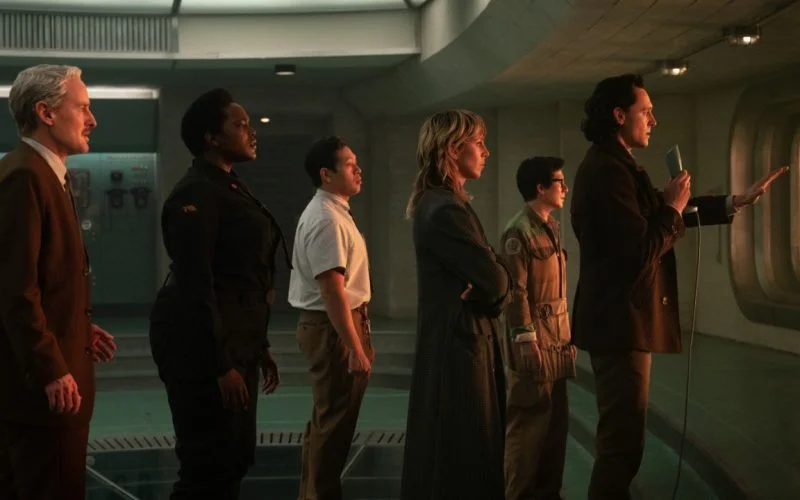The Great and Not Great of Loki Season 2
This review contains full spoilers for all episodes of Loki season 2, now available on Disney+.
In the Marvel Cinematic Universe, closure is rarer than an Infinity Stone and just as powerful if used correctly. From Robert Downey Jr.’s Iron Man to Chris Evans’ Captain America, we have seen graceful ways to bow out of a beloved role, and we have seen rough ones. (Our condolences to Scarlett Johansson.) Initially facing an undignified end in Avengers: Infinity War, Tom Hiddleston’s Loki was instead granted a cosmic mulligan to find his purpose in surprising and chaotic ways over in a new Disney+ series. There’s no question that the season 2 finale of Loki brought to a close one of the most poetic and dramatically satisfying character arcs in the MCU – but does a strong finish for the God of Stories negate the meandering five episodes that preceded it? Is Loki season 2 a great season of television, or is it a batch of half-baked streaming fodder topped off with a god-tier MCU moment? Can it be both?
The creative contrasts between seasons 1 and 2 are too glaring to pretend this series has always been some richly textured tapestry of story and character. Loki has endured seismic shifts in direction over its 12-episode life, swapping Kate Herron’s colorful goofs for the moodier energy of Synchronic’s Justin Benson and Aaron Moorhead. Rick and Morty veteran Eric Martin rose to head writer and guided Loki and the Time Variance Authority through more streamlined fetch quests and occasionally intriguing character moments that ultimately unspooled like so much cosmic spaghetti. All involved were charged with steering this massive series alongside the changing currents of Marvel’s multiversal plans and were tasked with positioning Kang the Conqueror (Jonathan Majors) as the franchise’s next big cosmic threat. They succeeded in one of these endeavors, at least.
Season 2 pivots away from the first season’s parade of Loki variants – though Sophia Di Martino’s Sylvie was too good a character to let slip through the cracks – to focus on its TVA ensemble. It tosses in Ke Huy Quan’s upbeat repair fellow Ouroboros and tasks him with amiably relating the series’s ceaseless barrage of sci-fi jargon to the audience. There’s increased screentime for characters like Owen Wilson’s Mobius, whose chemistry with Hiddleston is a highlight for the series even if he’s still mostly defined by his yen for Jet Skis and key lime pie; Mobius is a father in his variant life, but our understanding of his happily ever after, especially now that it looks like Loki Season 3 isn’t going to be a thing, remains distant.
To be fair, this increased screen presence doesn’t do much to make any of these characters seem interesting. As season 2 plunged the multiverse into madness, fellow TVA employees Hunter B-15 (Wunmi Mosaku) and Casey (Eugene Cordero) also explored what might have been had they not been plucked from reality to serve the interests of He Who Remains (Majors). While there’s a clearer idea of the paths not taken by these time-cops – B-15 would be a wonderful doctor, for instance, while Casey makes a terrible thief – the depth they’re provided is shallow.
The only thing Martin and company can muster for these characters – including once-consequential players like Renslayer (Gugu Mbatha-Raw) and Miss Minutes (Tara Strong) – is a vague feeling of discontent and longing. When they’re not trying to grasp the stakes, they’re voicing platitudes so generic their fears, hopes, and dreams scarcely register amidst Loki’s larger implications for the MCU. Also indulging in the sweet variant life this season is Hunter X-5 (Rafael Casal). He ducks out of his TVA duties to become Brad Wolfe, evidently The Action Star of the ’70s, and from the looks of his screaming fanbase and the lavishness of his latest movie premiere (or Marvel’s cheap shorthand for ’70s lavishness, i.e. Loki gets a ruffled dress shirt), X-5 is content with his variant’s success.
The “Brad Wolfe” variant subplot has legs, and says much about how He Who Remains stifled the TVA’s humanity as his people-pruning puppets. It bolsters B-15’s changing views about the timeline and even triggers a minor insurrection within the TVA ranks that ultimately gets swept away midseason to make room for Loki’s paradigm-shifting ascent in the final two episodes. It’s hard not to imagine what this plotline would have done for, say, Mobius, B-15, Casey, or any of the characters who stand with Loki during the finale instead of throwing in another character who dies (in admittedly creative fashion) midway through. While its scope rightfully narrows to the TVA – giving viewers ample opportunities to enjoy its vividly retro sci-fi aesthetics – the character moments in Loki season 2 remained as superficially disposable as those in season 1.
The only things most people might remember from Loki season 2 take place in its final episode.
As a mechanical fixture in the wider megastructure of the MCU, Loki hasn’t always been a consistently functioning one, but it’s at least been periodically amusing to watch the series grind its gears. But this late into the Multiverse Saga, Marvel could sure do with an oil change. If season 2 succeeds at all, it’s when it briefly straddles the narrow line between Marvel chessboard positioning and the substantial character drama we expect from virtually any other piece of fictional media. All the consequential stuff, the only things most people might remember, takes place in its final episode. While that amazing finale offered a poignant reminder of why audiences fell in love with Loki – and showed us precisely what the burden of glorious purpose looks like – the preceding five episodes left viewers trudging through the chaos that comes with a lack of a unified vision.
